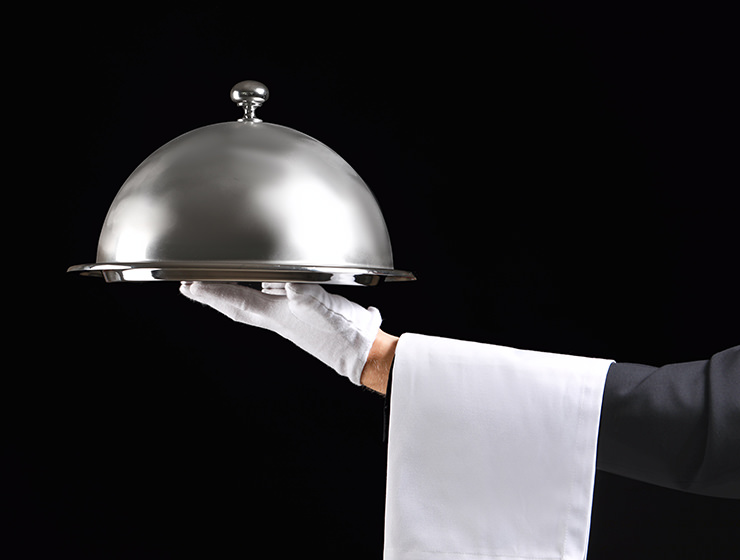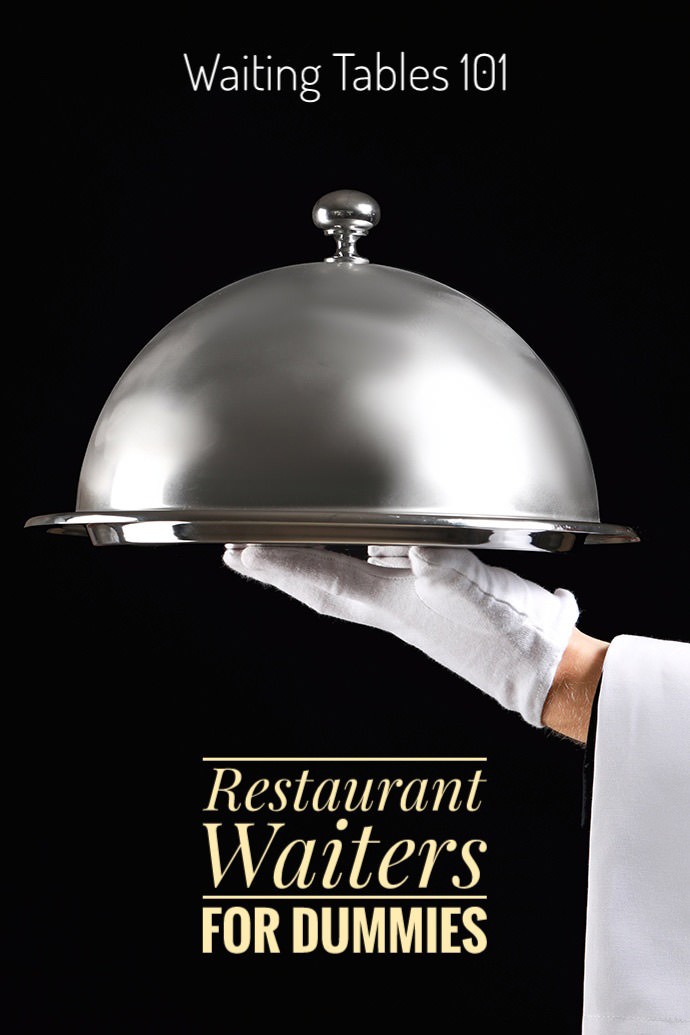If you are waiting tables in a dream, the meaning is interpreted as exhausting yourself by helping and assisting others while failing to take care of yourself. I never had dreams about waiting a table, nor have I ever fantasized about a waiter’s career. Yet, I spent half a year doing just that: serving guests in a couple of hotels, with no prior experience whatsoever. This is the first chapter of waiting tables 101, an introduction to the world of restaurant waiters.
Now, I am not writing this from a know-it-all position. I don’t have approved expertise in the F&B business. I have never studied catering. The closest I got to serving others before had a performative nature. Nobody says that carrying out a soup with eyeballs and worms, at an event adequately named “Freaky Friday: The Last Supper” (Zagreb, 2016), deserves a high place in any hospitality CV.
Through observing, using common sense, executing full presence and dedication, anyone can succeed in waiting tables
Lessons I want to share in this ‘How to wait tables for dummies’ manual come from hands-on experience gained in one summer.
In the beginning, there were colleagues laughing at me for not knowing how to properly hold a tray. My first boss claimed I was not fine-dining waiter material.
Yet, three months later, I was among the top waiters in a 5-star hotel and got to serve in a restaurant included in the Michelin Guide.
This fast-paced journey was not enabled by a special waiter’s talent crouching in me. Mainly by using observing and common sense, and executing full presence and dedication, all tools of social intelligence, I managed to prove doubting Thomases wrong.
The success had a cost as well, but every school does.
If you are considering waiting tables for a living, I hope you can take something out of this insider report from the world of the waitstaff.
Room service is a special branch in the hotel business. It fulfills guests' wishes by delivering anything from caviar to LEGO sets. Check out the most unconventional room service in the world!
Waiting tables for dummies

Jumping into the market
Before 2020, the waiter’s job seemed to be a reserve parachute. When all other job options fail, taking a tray in your hands and serving tables at a restaurant could save you.
Then the pandemic struck, and suddenly waiting tables was not a miraculous backup solution anymore. Bars and restaurants closed. The catering business suffered enormously. If your job type was disabled on the market too, becoming a waiter certainly stopped being plan B.
Waiters started googling ‘alternatives to waiting tables’. Many retrained and embraced new and more secure occupations.
That had consequences. The markets with the strongest touristic recovery of summer 2021 (Croatia, Turkey), experienced a lack of qualified personnel. It was a piece of good news for those who were not qualified waiters but could seemingly blend in.
Among aspiring hairdressers and beauticians, even this journalist found open doors into a market suffering from a shortage in the supply of the labor force.
Frankly, with a former experience of some job rejections due to being overqualified, I did censor my resume. I cut all the awards and accomplishments out and shortened the bio into a simple one-page sheet that would not scare anyone away. And I passed!
I didn’t know if I would find myself working as a waiter. But I also didn’t worry much.
My application for the waiter’s job was tactical. Back then, it was not certain whether the Covid-19 vaccine would be widely available. Living in a country highly dependent on tourism, I was sure touristic workers would be vaccinated first. So even if I wouldn’t finish the season, I thought, at least I would have gotten the shot that would allow me to resume traveling internationally.
I did not anticipate that Croats, with minimal trust in authorities, would also be among the strongest Covid skeptics in Europe. Nobody would be fighting for vaccines.
The pandemic will inevitably change how hotels operate. Check out how luxury escapes in Cambodia are preparing for the future!
Figuring things out
My first shot at waiting tables happened in a buffet restaurant at a 4-star hotel. They gave me a uniform and sent me into the restaurant hall to serve food. Nobody even showed me the place. If guests asked me ‘where do you keep bread’ or ‘how to get to the loo’, I had to improvise.

With colleagues’ help and some basic sense of improvisation, I somehow managed to stay afloat in these rough waves they threw me in, hoping I would be able to swim. I was. But this operation was running on luck as fuel.
I was always showing up on time, I wasn’t taking cigarette breaks, and generally, I tried to invest full effort into the job. This lead me to one of my first lessons: Good managers could recognize your motivation and endeavor, but not-so-good managers might just want to exploit it.
One of the latter, who was lacking basic leadership skills, used every opportunity to punish my availability with extra work, just because I was reachable and at service. On several occasions, while bombed with these additional chores, I would have been late for the bus home, or wouldn’t even have proper time to undress the uniform. It was a silly way to exercise one’s authority.
Even if I had a server’s contract, soon they gave me the wallet and the responsibility for charging guests. When I had to hand over my cash to a machine for the first time, the same soft-skills-lacking manager forbade any of my colleagues to show me the process, and said: “Figure it out on your own!” I had to give the earned money to the hotel, something that was not in my job description, and they didn’t even tell me how to do it.
Quitting waiting tables, and then starting over again
Obviously, there was a lack of proper communication at the establishment where I started waiting tables. Until the end of the probation period, I had no clue whether superiors were happy with my service, and what they saw me doing the rest of the summer.
It was me who had to request a meeting, only to find out that they were “of course, satisfied with me”. That was certainly not “of course” to me, and their intention to keep me was severely undermined by the shortages in communicating and organizing the work.
As long as it was offering me an insight into the hotel industry, I was open to any type of job: from baggage porter to receptionist
My boss didn’t see me progressing to the a-la-carte restaurant in a foreseeable future but instead wanted to keep me pouring soups on plates, and clearing out tables. I had no problem with doing any type of work, but this meant continuing to earn an under-average wage for waiting tables, but with no tips. And clearly, my investment in the work was not fully recognized.
They did offer me a raise if I stayed, to be completely frank. But I still decided not to accept it, and instead find an environment that would hopefully recognize better what I can bring to the table (yeah, a pun).
As long as it was offering me learning first-hand about the hotel industry, I was open to any type of work. I continued applying to job calls advertising a variety of positions, from baggage porters to receptionists.
Just when I was about to accept a receptionist offer in a 4-star hotel on one Croatian island, I was invited to an interview for waiting tables at a 5-star hotel in one of the most successful tourist destinations in the country.
They wanted me to start working as a waiter at the hotel swimming pool for a start, with an opportunity for advancement later. I accepted.
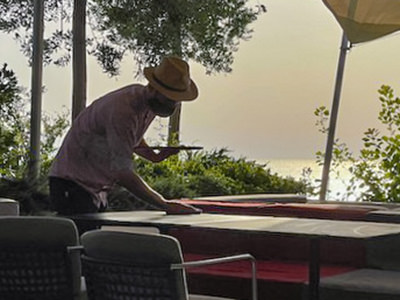
Swimming in sweat and praises
Working day-long shifts under a summer sun, at temperatures that can reach the high 30s, is not easy. Unlike hotel guests who head to the pool to suntan, waiters cannot show up in swimwear. Waiting tables during the Covid-19 era also demands a facemask as a part of the uniform (at some places, that one was financed through infamous junk fees)!
Some colleagues were fainting at a job that makes you rush in the heat. Human hunger wakes up around noon, and then everyone wants to order food, making the hottest part of the day – the busiest. It’s a perfect recipe for your shift ending up in sweat and dehydration.
Here I learned the first word from local restaurant lingo – swimming. Going underwater or drowning referred to being overwhelmed with customers. International waiters’ slang translates this phrase also as being buried, slammed, or falling into the weeds.
Swimming in customers’ orders is not how most of us imagine the perfect summer. But dealing successfully with additional pressure (and drinking water between orders!) can easily put you under the spotlight. And not the one provided by the star of our solar system!
Hotels reviews on Booking.com, Tripadvisor, and other websites started pouring in, with my name mentioned inside.
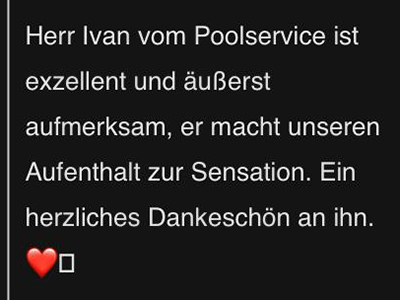
“Perfect service in the pool area, special thanks to Ivan!”
“The whole experience was great, but the best thing is the staff. They are very professional and smile all the time. I remember Ivan from the pool (…)”
“Mr. Ivan from the pool service is excellent and extremely attentive, he made our stay a sensation. A big thank you to him.”
The management was rewarding every waiter mentioned by guests with wine. Soon after the jokes about opening a wine cellar wore out, I proposed a sweet compensation as recognition for my efforts. And I got it – some tasty raspberry macarons the hotel’s pastry chef was famous for.
If you are struggling with how to respond to hotel reviews, check out my proposals!
Orange peeling – a sour path to getting noticed
My achievements exceeded the expectations of the management. While I might have been a solid accustomed waiter, my true wins were laying in guest relations and organizing the way I worked.
Sometimes, they’d schedule me to assist at breakfast in the hotel’s main restaurant. I would jump in with a variety of tasks: from washing cups and glasses, via replenishing juice dispensers and plates, to acting as a food runner, the worker that basically has to rapidly deliver food orders placed by the waiters in the kitchen. With about 60ish tables to accurately memorize, and hundreds of guests expecting warm meals, food running can overwhelm.
At one of these morning duties, I was literally peeling hundreds of oranges, so that hotel guests could start their day with fresh fruit juice. It’s a repetitive task, and it provides a lot of space for thinking.
What was I doing here? Would I even mention waiting tables in my resume? Or would I have to hide all of it, in order to not lose job opportunities that are better aligned with my skills and experiences? Should a reputable journalist keep this career detour a secret? Have I flown out of God’s blessing into the warm sun?
If you have ever experienced temporospatial disorientation, the confusion of not knowing where you are at a certain moment, it could have been travel fogginess! Check it out!
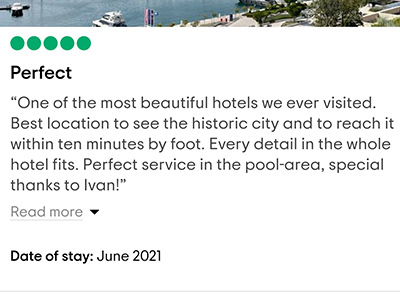
All jobs are educational. But my willingness to try anything once should not deter a visionary from seeing that putting me at an orange-squeezing station is a serious misplacement. Especially after the sales numbers and guest comments were highlighting me as a top waiter in one of the most successful Croatian F&B operations.
Just when I was peeling that orange number 237 (not that I counted), the F&B manager approached to ask me: “When shall we transfer you to XY?”. XY being the hotel’s most prestigious restaurant, aiming at Michelin stars.
Through thorns to Michelin stars
“We need someone of quality to join our team, as we aim to get the Michelin star”, the restaurant manager told me.
Really, me? Well, congratulations on the courage to experiment! A couple of months of waiting tables at the hotel’s pool have not taught me all secrets of the trade, and I cannot promise not to spill wine on that secret reviewer from Michelin. But, why not?
Just like with other stars, the path to the ones in Michelin Guide is also besprent with thorns of hardships. And the experience of the path as a hardship is very individual
I did cope with clearing tables at a busy breakfast restaurant, I managed to get decent tips from some of the hardest customers at the pool, and I survived even serving drinks to the hug-inclined crocked guests at a wedding. So what really stops me from trying out waiting tables at a fancy fine-dining restaurant?
Helping out at the hotel’s flagship gourmet outlet required a different type of concentration. After all, serving meals including seawater film, onion ashes, corn dust, smoked river trout pearls, and roasted pigeon, cannot compare to selling burgers and fries, the highlight of my pool summer.
While I was helping out by pouring water to guests at this high-end restaurant, the approval of the Michelin Guide arrived. Not in the form of a star, but a plate.
Lower-grade mention in the Michelin guide was encouraging for some, and disappointing for others.
But it was hiding another lesson: approval has many faces. Not everyone can be content with our content. Wowing others is a journey. Just like with other stars, the path to the ones in Michelin Guide is also besprent with thorns of hardships. And the experience of the path as a hardship is very individual too.
The hotel management wanted me to continue building my capacities through full-time waiting tables at this restaurant for the rest of the year. But in autumn, I decided to say (temporary?) goodbye.
Finding my weak spot
Waiting tables in your 40s is not the same as waiting tables in your 30s, or earlier. We can all force our bodies to go beyond limits in the everyday rat race, but the question of the significance of our investment eventually arises.
By following my path, I should have already learned that superpowers are a delusion. My approach to waiting tables would drain me.
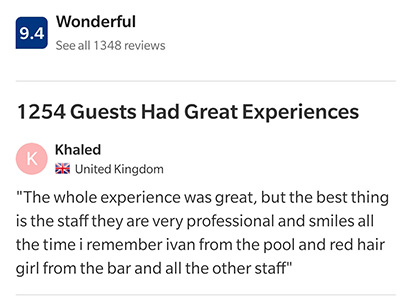
The six-day working weeks, with shifts that were often reaching 10 hours or more, took a toll. Imagine walking 20 kilometers per day (practically, a half marathon), under a burning sun, with full trays in your hands!
My quantitative results (I was generating 20-30 times higher revenues than my salary) came at the expense of prioritizing speed and even skipping lunch breaks. That was not healthy.
Male waiters sometimes had to engage in physical tasks, such as storing furniture in case of rain forecasts. A couple of times, I hit the concrete or wooden deck chairs with my toes and laughed it off in front of the guests. One day, my toenail literally separated from the toe. I was directing a live horror movie, but nobody screamed “Cut!”.
The cut happened when an eye infection forced me to take a break from the schedule full of overtime work. Resting in bed for a few days radically changed the dynamic I was used to, and my foot swelled.
Later I will learn that my waiting tables resulted in Achilles tendon tendonitis. I would be limping and healing for months.
But of course, I continued working for the last ten days of my contract, refusing to ask for sick leave and subconsciously hoping that someone would notice how dedicated I was. Food running with an inflamed tendon was a painful way to end my summer contract.
Top tips for waiting tables with success
Rewards, raise, promotion… It can all be a stimulus for working better, but how does one get to the point of getting them without destroying the body one came with? What are my takeaways from waiting tables at hotel restaurants? How can you find success?
1. Know that you can do it
My co-workers laughed at how I was sometimes holding a tray with two hands at the beginning of my contract. My boss told me that was not the way to do it at a 5-star hotel. Even if I was holding it in this way exactly because of that fact.
The fear of making a mess, like Taylor Swift waiting tables in that credit card ad, was pushing me to employ extra caution when nobody was looking.
It wasn’t true that I couldn’t hold a tray with one hand. After all, anyone with basic motoric skills and a sense of balance can do it. If I managed to juggle balls and walk on a wire, I was pretty sure no teapot on a tray could stop me from a gracious performance. Aware that I was working at a high-end hotel, I was just excessively cautious.
Working with wobbly light metal champagne glasses did not help. A gentle wind could throw them out of balance, and I learned that the hard way. Just like guests who didn’t take care of the wind effect on the priciest drink on the menu.
Allow yourself to mess up. Mistakes are human. Helping out a fellow co-worker is human as well. You can both do it.
2. Stay open to learning
Beyond mastering the basic waiting tables technique, being open to learning things can push you far.
In an international environment, you will come in contact with a variety of cultures. The guests might be calling their coffee differently, have a variety of expectations from their cocktails, and have a radically different definition of the salad they ordered.
Stay open to acquiring knowledge, and even better, dedicate time to learning new languages on Duolingo or a similar app on your bus ride home.
If you see unknown food items on the plate you are bringing to the guest, feel free to ask the chef about it.
If you struggle with using the bottle opener, do not hesitate to ask waiter colleagues to show you how it works.
As someone who has never drunk coffee, the territory of all those varieties and subtle differences was unknown to me. I never had issues asking my bartender whenever it seemed confusing. Besides general info, you might even get a free barista lesson, and learn how to make a cappuccino. Or a cocktail, why not?
3. Be present
Being present doesn’t mean that you should start skipping lunch breaks. Breaks are an integral part of your working day, and can only enhance your performance.
But when you are not on a break, being present is a must. It’s tempting to take a seat in the air-conditioned interior, but don’t make shade your anchor.
Guests should not be walking around to find you. If that starts happening, it is a sure way toward the swim.
On the other hand, by being present and delivering orders as they arise, you are saving yourself from drowning in the flood of raised hands all at once.
Distribute the pressure throughout the day, and you will be able to work more by working less.
4. Shoes for waiting tables must be high-quality
I know that your employer might be demanding the use of official shoes as part of your uniform. But if this is just an aesthetical request, you should be loud and clear about your orthopedic problems (even if you don’t have them), and find the next best thing that will adhere to the official color and design.
Don’t be cheap, and choose the best shoes for waiting tables. You will make miles in these, so consider the health risk.
Waiting tables is hard work, it could cause tendonitis, knee pain, back pain, general exhaustion, and even affect your stress level.
You might not be able to avoid all of these, but getting proper shoes and finding the least burdensome waiting tables technique is a healthy first step into the waiters’ market.
Not wearing proper footwear could have long-term effects on your employability in the future! In my case, even three months after I stopped working, my feet are still not fully capable of engaging in physical work.
5. Saying ‘yes’ opens doors
Especially at high-end establishments, treat guests with a positive response. This doesn’t mean that guests are always right, or that their demands can go against the grain. But staying open to their interest in talking to you will eventually pay off.
The same goes for your superiors. Accept glass polishing as a rewarding challenge, not as a punishment you’d like to avoid. Filling baskets with bread in the morning? How exciting! Serving at an event? Why not! Every accepted proposal will be a testimony of your enthusiasm and flexibility, the essential founding stones of advancement.
Saying too many ‘no’s’ could translate into a big no, both when it comes to getting tips, as well as when promotion becomes a topic.
Do your part, and keep a positive attitude. If doing so, guests will promote you in front of your bosses, and bosses will promote you in front of co-workers who prefer saying ‘maybe’.
How to start waiting tables – Conclusion
Someone went to college and now he is a busboy. This peculiar narrative exposes waiting tables as a career downgrade.
At best, as presented in “Waiting Tables” by Don Henley, it is seen as a job in-between. Something for a year or two, before moving on, or until something better comes along.
Waiting tables could teach you concentration, multitasking, organization, anger management… It could seriously improve your emotional capacities and social intelligence
However, the waiter’s profession could be an exciting space of challenges. Waiting tables and acting have a lot in common. Sometimes, I’ve even seen it as dance choreography. There is something rather intriguing in this system of serving others, with ever-changing power dynamics.
I feel everyone should work as a waiter at one moment in their life. Waiting tables could teach you about concentration, multitasking, organization, anger management… It could seriously improve your emotional capacities and social intelligence.
It is one of the rare jobs that in many countries still doesn’t require a degree, so starting with waiting tables leaves a democratic space for success for practically anyone.
For me, it was a part of the learning curve about the hotel industry from the inside. I think it was quite a successful adventure, and hope that it would lead me somewhere further.
Of course, if you do wish to start waiting tables, I believe you can still impress without losing a toenail or getting tendonitis.
Take care of your health, take care of your customers, and take care of your employers. Approach it as an open application, where you can show off what you know, and learn what you don’t.
Waiting tables could seem like one of the simplest jobs in the world, but it’s the perfect place for fine-tuning a variety of your soft skills, which can help you in any work environment you wish to express yourself in the future.
How did you like the first part of ‘Waitressing for dummies’ manual?
What are your experiences with waiting tables?
Do you have questions you are eager to ask?
Share your thoughts in the comment section below.
If you liked this ‘Waiting Tables for Dummies’ manual (part one), pin it for later!
And remember to come back for more insight into the world of restaurant waiters!
The cover image of this article was purchased through Depositphotos, my go-to platform for high-quality licensed stock images. They have great photo deals, so check them out!
Disclosure: This post may contain affiliate links, which means if you click on them and make a purchase, Pipeaway might make a small commission, at no additional cost to you. Thank you for supporting our work!

